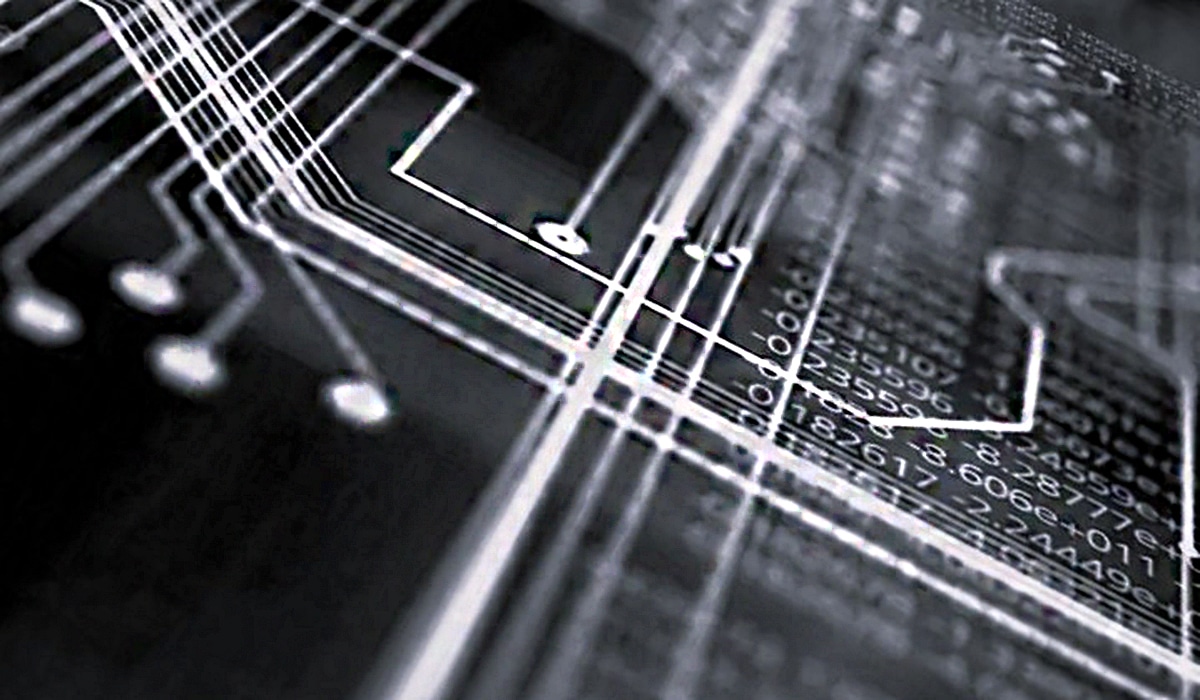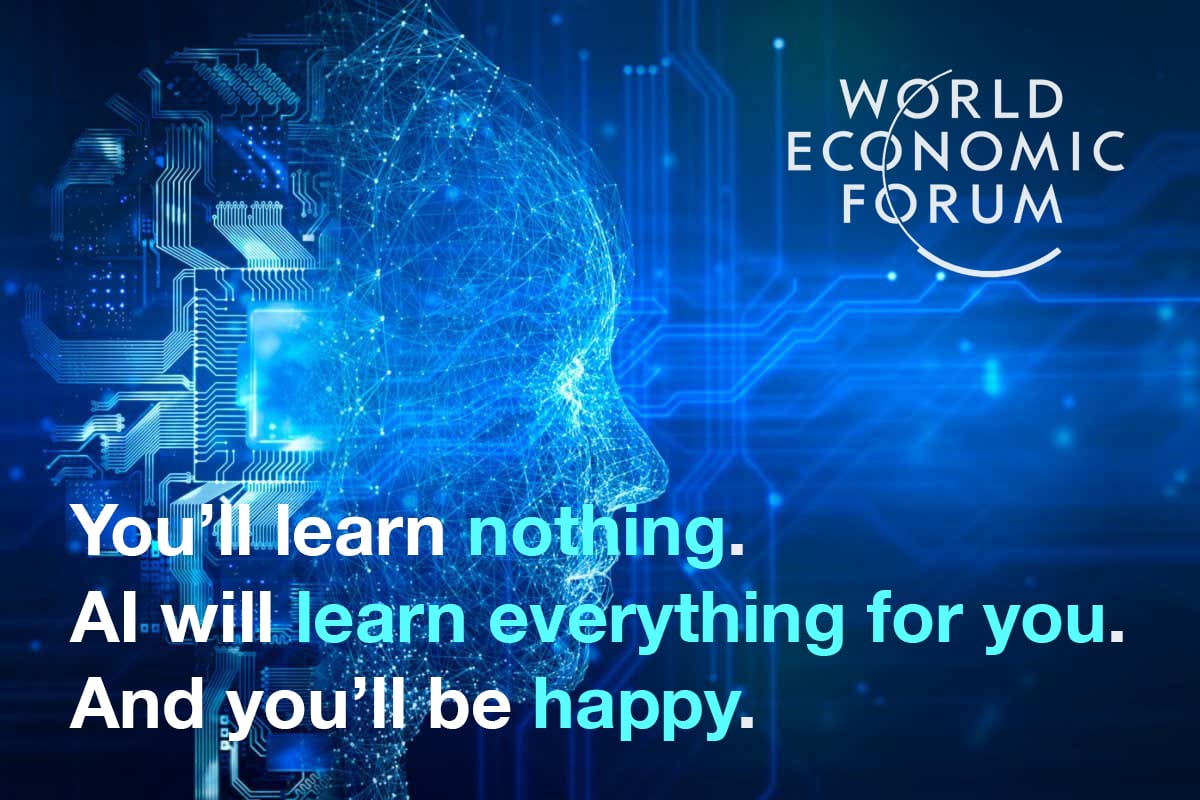

For an internet-free future!
by Paul Cudenec (who reads the article here) | Sep 3, 2025
Our human condition and our physical strength are wasting away and being replaced by the voluntary and happy submission of a ‘connected’ slave, now unaware of even the possibility of a simple and autonomous life, bonded with others and involving a relationship to soil and place…
Unlike those of the past, he is not even conscious of his slave status”. [1]
So writes the French musician and essayist Hervé Krief in his book Internet ou le retour à la bougie, ‘Internet or going back to the candle’.
The dangers of AI and the digitalisation of our lives are today becoming increasingly obvious to an increasing number of people.
Not only are machines and computers replacing us in our trades and professions, but they are deployed to constantly monitor and measure us. They also commodify our lives by using the resulting data to fuel the financial machineries of 21st century “impact capitalism”. [2]
Krief describes the nefarious role of smartphones in what he calls an “atomisation” of modern people’s brains, which had already got underway with televisions.
He says that in recent years he has been carefully observing people’s behaviour in the streets and in cafés, restaurants and trains: “I feel I have noticed significant changes”. [3]
“More and more people are looking at their smartphones as they walk along, or writing text messages.
“They are no longer interested in what and whom can be found on their path, they live outside the real – connected to the megamachine of the Internet, but completely disconnected from the world in which they exist and from the others who populate it.
“Thought, memory and attention span are disappearing in favour of a new soul whose construction rests on foundations no longer defined by a shared history transmitted from generation to generation, but by the Internet industrialists and an army of researchers and experts in their pay”. [4]
“The arrival of this IT terminal connected to the Internet (called a smartphone) in the hands of each and every Earthling points to a complete transformation of human nature.
“It also means the irreversible suppression of human cultures. These two foundation stones, human nature and culture, are melting away and disappearing into a single standardised uniformisation of individuals”. [5]
Krief adds that instilling in everyone, in all walks of life, the absolute necessity of being permanently connected to the digital matrix is “a success… for the industrialists and states, and a catastrophe for everyone else”. [6]
Considering the enormous effect that the internet is having on our lives and our societies, the general lack of concern surrounding its advance is peculiar.
Krief writes: “The Internet took hold of Western populations with disconcerting ease, being welcomed as a new and natural step in the evolution of humankind”. [7]
He says it has managed to unite, in shared veneration, “partisans of the established neoliberal order and almost all of their opponents, who are dedicated to changing a world they find unfair.

“These two camps both see the Internet as the solution for finally overcoming all the problems with which they are confronted.
“It is obvious, but often unrecognised, that the Internet is the continuation of a movement that began with the arrival of the first machines in England at the start of the 19th century.
“It is the extension of industrial and technological capitalism, of the mechanical and scientific thinking that has dominated the world since then. [8]
“How can partisans of social justice thus place all their hope in the Internet? Or not notice this contradiction?” [9]
This is an important point – the current AI-enabled changes to our lives are merely the current phase of a centuries-long process that I have been documenting in my work.
We can trace it through the (deliberate and co-ordinated) launch of “scientific thinking” in the 17th century, [10] through the industrialisation of our lives, [11] through all the “planning” [12] and “development” [13] and “modernisation” [14] that have progressively been imposed on us by the global slave-masters.

This process has not been good news for us. We have been streamlined and domesticated to make us more productive units of human capital, our communities and spirits crushed, our traditional know-how and wisdom stolen from us to make us helplessly dependent on our overlords and their system.
And this enslaving mechanism – disguised as positive “social change” – moves ever faster.
Krief observes: “Technical acceleration is inherent in industrial society and was there from the start.
“The first machines in the English textile industry aimed to accelerate production at the expense of quality, so as to increase exports to the continent. All the machines that followed continued this dynamic of acceleration”. [15]
He explains that exploitation lay at the heart of industrialism right from the go.
To illustrate this, he cites an account by Nicolas Chevassus-au-Louis of how the switch to a factory system in England demanded a lot of capital investment but the great advantage was that the new machinery could be operated by women and children – “in other words a more docile workforce, less liable to revolt”. [16]
The dehumanisation worsened after WW1, under the efficiency-increasing “Taylorism” named after Frederick Taylor, a proponent of the “scientific organisation of work”.

Says Krief: “This allowed the workers no creativity, no initiative – they became cogs in a machine devised by engineers”. [17]
Taylor himself “regarded factory workers as ignorant and incapable sub-humans”, he says. [18]
A century later this approach has spread across the whole of society, with all of us regarded by those in power as mere statistics in their ledger of control, rather than as the free men and women we were born to be.
And yet this constant deterioration in our existence, this relentlessly unfolding disaster is sold to us by the ubiquitous shapers of opinion as a good and necessary thing!
As Krief remarks: “The bad sides, the ill effects, of inventions are always denied”. [19]
He notes that we are never asked whether we agree to whatever new technology is being introduced, with every such change being treated as both desirable and inevitable.
“Scientific progress is moving at an ever faster pace and we are supposed to try to keep up with, and adapt to, each new invention by choice or by force”. [20]
A consensus has been carefully manufactured to ensure that this process continues uninterrupted.

Krief notes that, since the Luddite revolt in England 200 years ago, social movements for improving factory conditions and wages “have practically never called into question the machines and the industrial society they generate”. [21]
He rightly points to the role played by Marxism and its “scientific socialism” in ensuring that all so-called opposition to the dominant system remains inside the industrialist framework. [22]
It is rare to find a social critique that addresses the essential problem of industrialism and its tools of control.
Krief refers to those who champion free and open-source software and promote the idea of a “freedom-protecting” internet used for the common good.
“This is obviously a trap and a shameful falsification. Free software cannot do without all the technological machinery and infrastructure controlled by Big Tech.
“It does nothing to modify the transformations being endured by our society and our human condition or the accompanying destruction”. [23]
The most deadly illusion that has been created around AI and the internet is that it is somehow green and clean, heralding a lovely new virtual world where there is no mechanical messiness or old-fashioned pollution.

This false impression has been boosted, here in Europe anyway, by the moving of much industrial activity to other parts of the world, which some wrongly interpret as a general “deindustrialisation”.
Says Krief: “This is a deliberate operation, which consisted of shifting industrial mass production to distant lands.
“It seems to me that this serves a double purpose – to conceal, to hide from Westerners’ view, the factories and all their pollution, human slavery and social alienation; and also to cut the costs of production so as to increase the profits of the multinational corporations”. [24]
Behind the seductively shiny surface of the virtual world lurks a repulsively repugnant reality.
Krief points out that all the gadgets that connect us to the internet are manufactured with mined materials and the use of toxic chemicals, using huge amounts of oil and water.
“This means that entire populations are sacrificed on the altar of extractivism, which is essentially the same thing as technological progress.
“In Latin America, in Africa and in China, as everywhere else across the world, the industrial exploitation of nature is intensifying without any consideration for the peoples who live in the territories concerned”. [25]

They are thus robbed of their autonomy, their culture and their ancestral lands – just as English people were at the very start of the industrial assault on human happiness.
Those who insist on remaining in the mined areas have to drink poisoned water and breathe poisoned air.
Others end up crammed into urban slums or living in nightmarish factory towns, paid a pittance, sleeping in dormitories, their lives scientifically reduced to squeeze out the maximum profit for the “wealth-creating” global corporations that sell us the internet.
Krief remarks: “As with the African slaves who threw themselves off the boats which were uprooting them from their homeland, suicide appears the only way out for the most sensitive and destroyed among them”. [26]
When you add in the vast amounts of electricity required to feed the global matrix – with all the power stations and industrial solar and wind power sites needed to generate that electricity – the monstrosity of the whole project becomes even clearer.
Krief stresses: “The Internet is very far from being a marvellous dematerialised or virtual world.
“Its existence depends on colossal investment and gigantic infrastructure and results from an extreme concentration of power.
“It is undeniably the current phase of global capitalism. It is the necessary means of bringing about a new ‘smart’ society.

“The idea of a green, alternative Internet – one that is not destructive or does not pollute our environment and which also belongs to the people or to small communities – is mere fantasy”. [27]
Contemporary “environmentalists” who think the internet could be part of a future nature-respecting and autonomy-based society are simply fooling themselves, he says.
This brings me to the thorny issue of how we critics of industrial modernity should conduct ourselves in the age of the internet.
I am often tempted to take myself out of the virtual world, at least to the extent that the contemporary management of our society allows.
But then it strikes me that this would amount to a cop-out, a desertion, a failure on my part to play my full potential role in the battle for the future of humankind currently entering such an important phase.
It is obviously possible, after all, to use the internet in order to criticise the internet and the global industrial system behind it.
Indeed, I personally feel that I have a duty to turn the tools of our oppressors against them in any way that I can, for as long as I can.
The key thing is to remain aware of what the internet is, to understand that our use of it for dissident purposes is merely pragmatic and provisional, to contest all the propaganda glorifying it and, above all, to offer it no place in our vision of a free and healthy tomorrow.

Subscribe to Winter Oak
[1] Hervé Krief, Internet ou le retour à la bougie (Montréal: Les Editions Ecosociété, 2020) p. 96. All translations are my own and all subsequent page references are to this work.
[2] https://winteroak.org.uk/impact-slavery/
[3] p. 32.
[4] p. 36.
[5] pp. 40-41.
[6] p. 41.
[7] p. 18.
[8] See Paul Cudenec, ‘The “scientific” war on our freedom’. https://winteroak.org.uk/2025/08/15/the-scientific-war-on-our-freedom/
[9] p. 9.
[10] Paul Cudenec, ‘The Invisible College and the plan for our enslavement’. https://winteroak.org.uk/2025/08/22/the-invisible-college-and-the-plan-for-our-enslavement/
[11] Paul Cudenec, ‘Industrialism is a manifestation of Evil’. https://winteroak.org.uk/2024/10/28/the-acorn-97/#1
[12] Paul Cudenec, ‘The Big Plan and the Great Gaslighting’. https://winteroak.org.uk/2025/04/09/the-big-plan-and-the-great-gaslighting/
[13] Paul Cudenec, ‘A developing evil: the malignant historical force behind the Great Reset’. https://winteroak.org.uk/2022/08/02/a-developing-evil-the-malignant-historical-force-behind-the-great-reset/
[14] Paul Cudenec, ‘Modernisation means pillage and profit’. https://winteroak.org.uk/2025/01/31/modernisation-means-pillage-and-profit/
[15] p. 18.
[16] Nicolas Chevassus-au-Louis, Les briseurs de machine. De Ned Ludd à José Bové (Paris: Seuil, 2006), cit. p. 46.
[17] p. 47.
[18] Ibid.
[19] p. 14.
[20] p. 15.
[21] p. 16.
[22] p. 17. See also Paul Cudenec, ‘Communism and industrial imperialism’. https://winteroak.org.uk/2025/03/31/communism-and-industrial-imperialism/
[23] p. 57.
[24] p. 14.
[25] p. 68.
[26] pp. 70-71.
[27] p. 63.







0 Comments